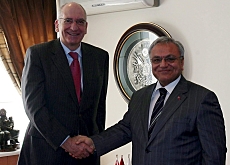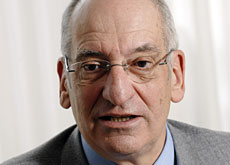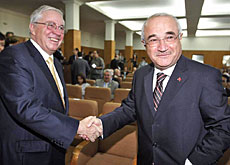Couchepin addresses Armenian murders

Swiss Interior Minister Pascal Couchepin has ended his five-day trip to Turkey by meeting Archbishop Mesrob II, the Armenian Patriarch of Constantinople.
The pair discussed the recent murder of Turkish-Armenian journalist Hrant Dink, as well as the controversial “Armenian question” – whether Armenians suffered genocide at the hands of Turks almost 100 years ago.
Earlier in the week, Couchepin, who holds the culture portfolio, met Atilla Koç, the Turkish minister for culture and tourism, in Ankara and agreed to pursue a bilateral accord aimed at returning cultural goods.
On Tuesday Couchepin met Turkish Prime Minister Recep Tayyip Erdoğan, with whom he discussed the Armenian killings.
He then spent two days in the southeastern part of the country, populated mostly by Kurds, where he visited projects supported by Switzerland.
Tense time
Couchepin’s visit to Turkey came at a tense time. On January 19 Hrant Dink, a Turkish-Armenian editor who wrote articles referring to a “genocide” of Armenians, was murdered in Istanbul. Eight ultra-nationalist suspects, including the alleged teenage shooter, are under arrest.
Armenians say Ottoman Turks slaughtered up to 1.8 million Armenians in a planned genocide between 1915 and 1919. Turkey vehemently denies that the mass killings were genocide, saying the death toll is inflated and Armenians were killed in civil unrest as the Ottoman Empire collapsed.
Dink’s murder prompted international condemnation as well as debate within Turkey about free speech and whether state institutions were tolerant of militant nationalists.
The killing also served as a catalyst for questions about whether Turkey should pursue Western-style values such as free expression – as embodied in its bid to join the European Union – or cling to nationalist pride that views outside influence with suspicion.
More than 100,000 people marched at Dink’s funeral, many of them chanting for Turkey to abolish a law which makes it a crime to insult the country or the Turkish national character.
Mesrob II told Couchepin the 90,000 Armenians in Turkey were a “peaceful minority” and Dink’s murder had triggered a sense of unease.
He said he would like to see the Turkish authorities make a “moral gesture” – admitting regret, for example, would diffuse the tension, he told Couchepin.
Nuanced approach
Couchepin had previously said an important step would be the creation of an international commission that would “examine the issues and look for the causes of the events of that time – including the massacre”. The Swiss government does not officially speak of genocide.
On his visit, Couchepin broached issues of freedom of expression and human rights and said a “nuanced” approach in this area was necessary for progress to be made.
“The negotiating partners should not be provoked,” he said.
Before his return to Switzerland on Saturday, Couchepin planned to meet four Turkish authors on Friday night.
Among the authors is Ipek Calislar, who went on trial and was acquitted in December of charges that she insulted Turkey’s founder, Mustafa Kemal Ataturk, by claiming in a biography of Ataturk’s estranged wife that the leader fled an assassination attempt dressed as a woman.
swissinfo with agencies
The historical interpretation of the deaths or deportations of between 800,000 and 1.8 million Armenians between 1915 and 1919 has caused tensions between Turkey and many European countries.
The killings have been recognised as genocide by the parliaments of several countries, including France, Russia and Italy.
The European Parliament recognised it in 1987.
The Swiss House of Representatives followed suit in 2003, but the Senate did not.
The Swiss government does not officially speak of “genocide”, but of “mass deportation” and “massacre”.
There are 80,000 Turks living in Switzerland and 6,000 people with Armenian roots.
In 2004, Swiss exports to Turkey were worth SFr1.9 billion ($1.45 billion), 17% more than in 2003.
Among Swiss firms established in Turkey are Novartis, Nestlé, ABB, Ciba, Roche, Givaudan and Syngenta.

In compliance with the JTI standards
More: SWI swissinfo.ch certified by the Journalism Trust Initiative



You can find an overview of ongoing debates with our journalists here. Please join us!
If you want to start a conversation about a topic raised in this article or want to report factual errors, email us at english@swissinfo.ch.